Apostles to the Slavs
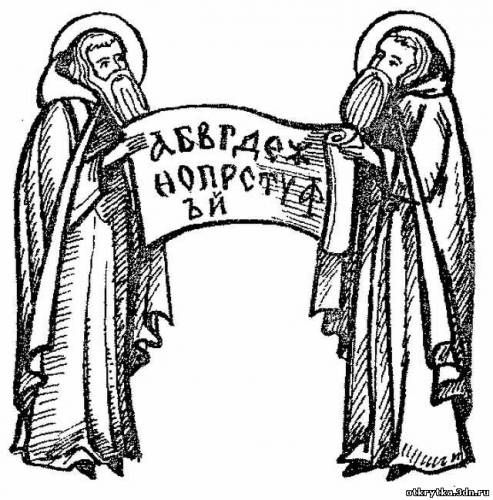
Two brothers, Ss. Cyril and Methodius, were Byzantine missionaries, teachers, and theologians who are best known for their work of evangelizing the Slavs, which is how they earned nickname alluded to in the title. They were born in Thessalonica: Methodius, the older brother, was born in 826, and Cyril was born in 827.
As missionaries the two brothers traveled to lands far and wide to spread the Gospel. They first went to the Khazars in the northern Caucasus and learned the Khazar language. From there they were invited by the Moravians to head northward. But it was during their work in the First Bulgarian Empire when Cyril invented the alphabet that would best fit the Slavonic tongue, later known as Cyrillic. This is the alphabet used to write old Church Slavonic that was and would be the language that the brothers used to translate the Gospels, the Psalter, Paul’s letters, and their distinct liturgy. It is even still used in parts of the Eastern Church today!
Later on they were called back to Rome, where the Church somewhat surprisingly endorsed their missionary activity, officially approved the Slavonic liturgy, and ordained the brothers as bishops. Yet while they were in Rome, Cyril fell sick and died in February of 869. Methodius, however, went back to the Slavs, back to a life that would deal him many trials. He was tried and jailed many times by German clergy and was despised for his refusal to use the Latin mass. Even though the pope continually approved Methodius’s use of the vernacular liturgy during his time, disdain for his approach continued. Perhaps some of this pushback came from jealousy for the ways in which God used Methodius to spread his Word: legend has it that he translated the whole Bible into Slavonic in just eight months.
Methodius died on Holy Tuesday—April 6, 885—with many saying that his health declined from these long struggles. Eventually use of the Latin liturgy prevailed, and many of the followers of Cyril and Methodius were forced into exile.
Despite this, the influence of these men stretched far and wide, forever changing the churches of the Slavs all over modern-day Bulgaria, Croatia, Russia, the Czech Republic, and Poland, to name just a few locations. Despite Cyril and Methodius’s advocacy of the traditions that Eastern Orthodox Christians still hold to today, these two have been long remembered as men who desired unity between what would later become the divided Church. Thus they have been celebrated by the Church at large since the ninth century and heralded by Christians all across the globe.
A Brief History
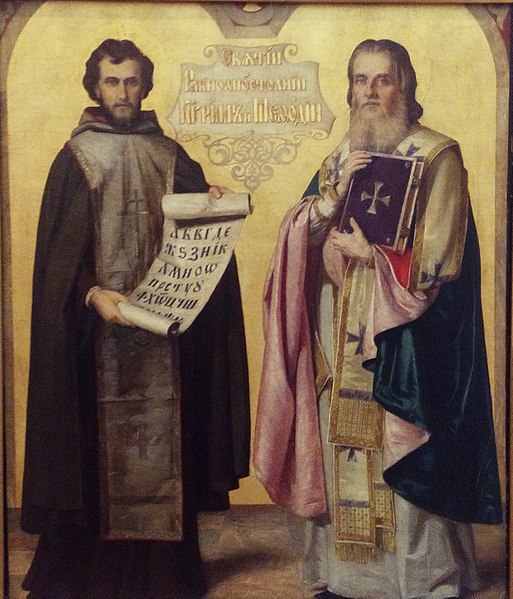
The Church celebrated the feast day of these brothers almost immediately following their death; however, the date has changed locations in the liturgical calendar a few times. May 11th is the date given in the Lutheran Service Book, a date that Lutherans share with the Eastern Orthodox Church.
In many countries of Eastern Europe, this feast day is highly regarded as an “education, literature, and culture day” dedicated to the celebration of the Cyrillic alphabet and all that has derived from this invention.
However for us in the West, Ss. Cyril and Methodius still provide inspiration for our own Lutheranism in a few ways. Not only was their reverence for translating the Gospel into the vernacular language something that was later shared by Luther, but their commitment to the liturgy is something many of our churches still share today. These men also brought the Word of God to the Slavs, an ethnic group that has become a vital part of our LCMS, in no small part because of the Slovak Evangelical Lutheran Church, which later became a district of our Synod.
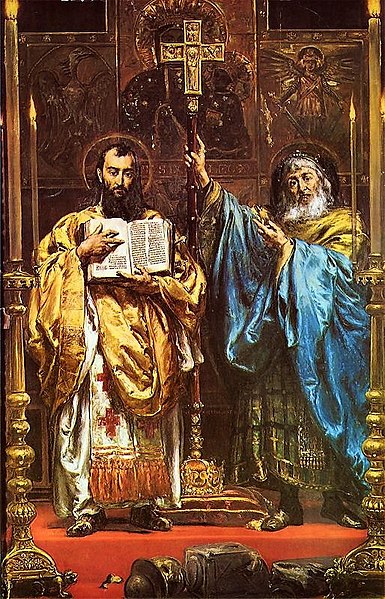
Collect
Almighty and everlasting God: Who by the ministry of Thy Blessed Confessors and Bishops Cyril and Methodius didst deign to call the Slavish people to the knowledge of Thy name, grant that we, who glory in their festival day, may be joined to their company; through Jesus Christ our Lord, who liveth and reigneth with Thee and the Holy Ghost: ever one God, world without end. Amen.
Lessons
Resources
Issues, Etc. interview with the Rev. Dr. David Coles on Ninth Century Missionaries Cyril and Methodius
Issues, Etc. interview with the Rev. James Krikava on Ninth Century Missionaries Cyril and Methodius
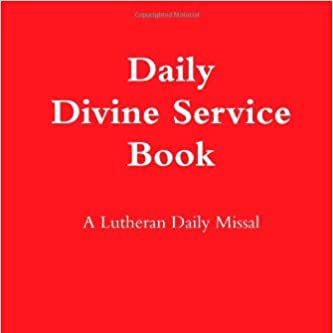
Propers found in Daily Divine Service Book: A Lutheran Daily Missal, edited by the Rev. Heath Curtis
References:
1. Weedon, William. Celebrating the Saints. Concordia Publishing House. 2016.
Images:
1. Ss. Cyril & Methodius with Cyrillic alphabet, Unknown.
2. Saints Cyril and Methodius, Uroš Predić, Serbia, 1912.
3. Cyril and Methodius, Jan Matejko, Czech Republic, 1885.
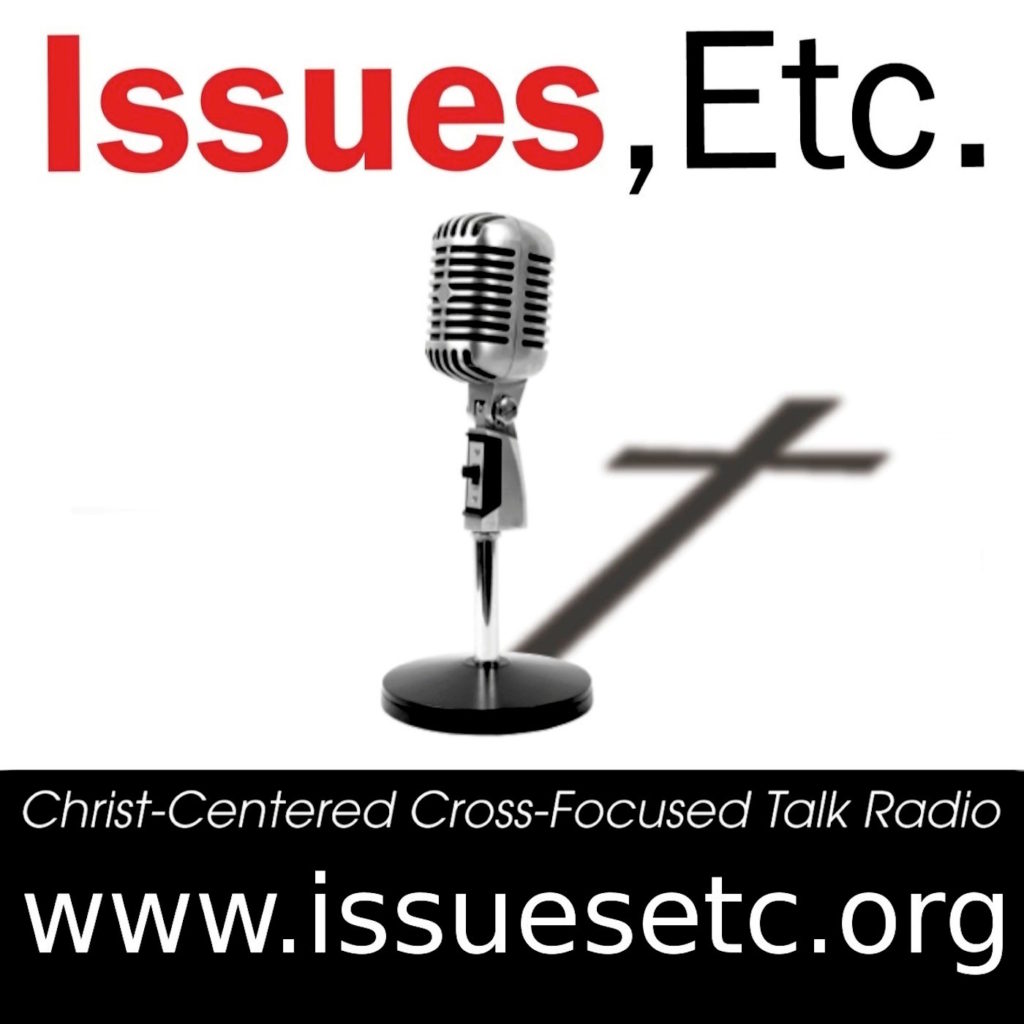


Thank you for this wonderful history of two saints I was unfamiliar with . I am very thankful for the work you do at All the Household . It is a very necessary work and blessing to the church .